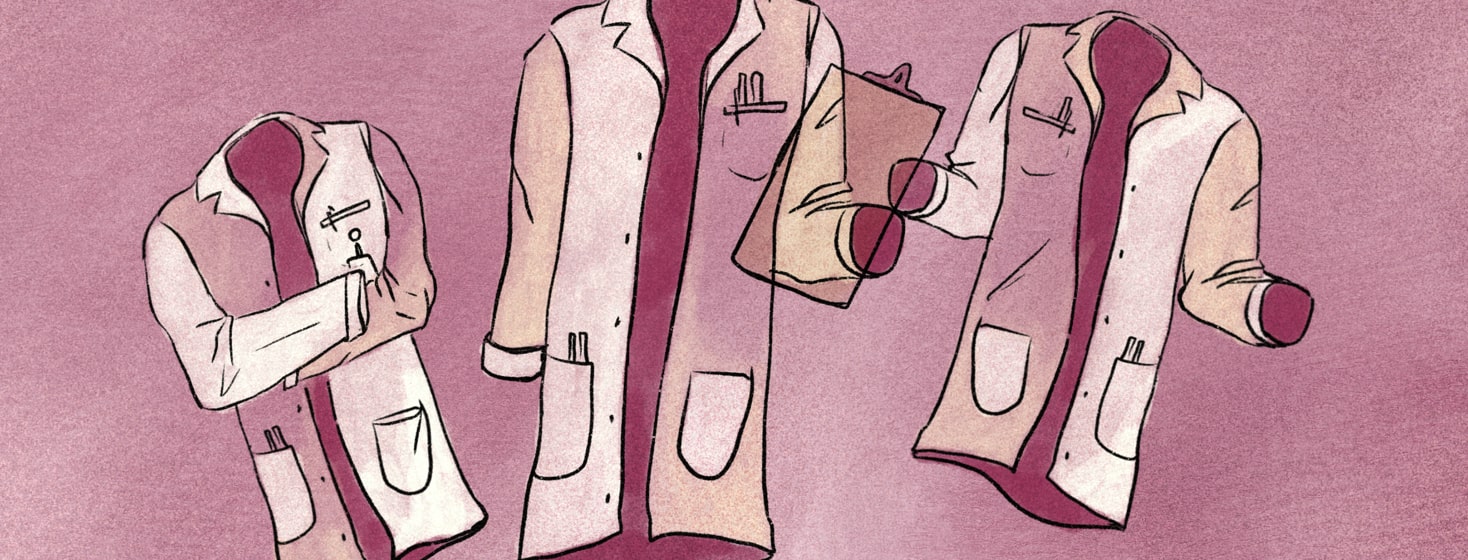Let’s Talk About the Whitecoats, Shall We?
Doctors and their whitecoats by their very nature are kind of cold and antiseptic. Doctors even have varying degrees of whitecoats depending on their longevity and skillset. Short whitecoats are the newbies, and longer coats represent the really smart and experienced older doctors.
As patients we start out at a disadvantage, because we don’t have whitecoats. In fact, sometimes they even make us wear coats that are multi-colored with open air back sides just to keep us feeling insecure, right? Or worse yet, stripped down to our undies. I don’t even take my shirt off at the beach anymore for Pete’s sake.
Going to different whitecoats
I have read recently that whitecoats are becoming passee for fear of hospital-acquired infections, and the more preferred is scrubs. But for the rest of my story, let’s keep thinking the “whitecoats.”
When I first started my cancer journey I was indeed a “babe in the woods.” Some whitecoat told me I had cancer, sent me to another whitecoat who was the cutter (forever Smiley John to me, and that’s another story) and finally on to another whitecoat, the oncologist.
They were way smarter than me
As a new patient, I knew less than nothing about my cancer. Smiling John the Cutter was telling me to get cut and remove my cancerous tumor only eight short weeks after my diagnosis. He was confident that the robotic surgery would be successful, even though I had read my PSA was so high (84) that my cancer had already probably broke into other regions of me.
I asked the whitecoat, and he assured me he could get it done. I didn’t know medicine; I was a plant manager that made car parts. So I said let’s do it. Of course, it did not work and I went onto full chemo anyway. Years later my oncologist did say I probably could have avoided the surgery and its unpleasant results – loss of man stuff.
There was an important lesson learned for me. I needed to become an expert in my disease and treatment options so I could hang with the whitecoats in treatment discussions and select what I wanted to do with my cancer and body, and be prepared to debate when necessary.
Breaking down the whitecoat wall
As time went on and my treatment progressed, I knew I had to get more control of the treatments I was going to undertake and be able to talk with my doctor. So, I learned, and after a lot of research, got to where I could hang with the experts and understand protocols and options and select what best suited my situation.
The whitecoats began to respect the fact that I did understand the options and could reasonably discuss the best form of treatment. I also felt some sense of control over my life again. The disease was not overwhelming me, and I could see a way to manage my path.
Biggest discovery about the whitecoats
Whitecoats are human. I know learning this was a game changer for me. I remember sitting with my doctor; he came in his whitecoat ready to do the doctor thing and tell me my status. I stopped him and said, “Hey wait before we talk shop, I’d like to ask you how are you? How’s your family?”
He turned away from the computer screen and asked me suspiciously, “Why are you asking?"
I told him simply that I cared. I wanted to know how the guy that was keeping me alive was and get to know him as a person, not just a whitecoat. I have been with this guy now for about ten years. We know each other well, can talk family, politics and cancer treatment, current and new.
He’s no longer just a whitecoat, but a friend and confident.
Final thoughts
Learn your disease, know your doctor outside of the whitecoat. You should be an active participant along with your doctor on the path your treatment takes. Remember they care and also have the same life issues we do – turns out my doctor’s Dad is fighting the same illness as I am.

Join the conversation